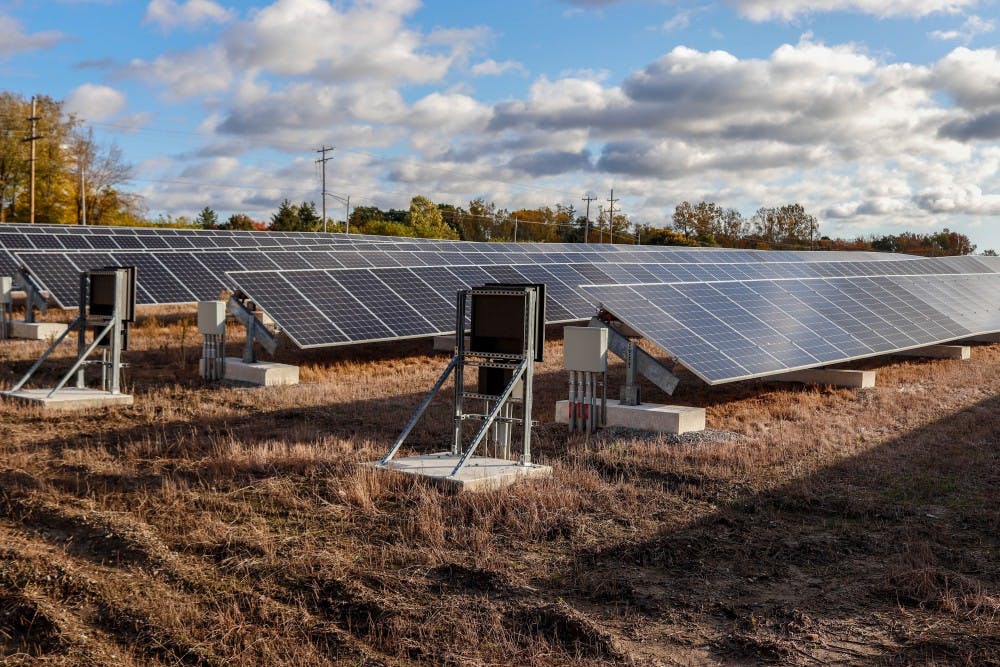A series of legislation referred to as the Clean Energy Package passed in both the Michigan House and Senate last Thursday and is expected to be signed by Gov. Gretchen Whitmer by the end of the month.
The package includes: Senate Bill 271, which sets the clean energy standard, Senate Bill 273, which establishes the energy waste reduction goal and Senate Bill 502, which establishes the extent of power the Michigan Public Service Commission holds with utility companies.
The package’s main points are to lower energy costs, eliminate barriers to creating new clean energy projects and to set the standard for utility companies to use 60% clean energy sources by 2035 and 100% clean energy by 2040.
However, many climate activists do not think that the bills do enough to combat the current climate crisis, especially following negotiations that undermined many of the provisions.
Courtney Bourgoin, senior policy and advocacy manager for the Midwest branch of Evergreen Action, said that the implementation of a clean energy standard from renewable energy sources would increase demand for federal tax credits from the Biden administration’s Federal Inflation Reduction Act.
“By basically mandating that utilities have to generate their power from renewable energy sources, it’s going to increase demand for those renewable energy tax credits,” she said. “So when utilities need to generate clean energy, clean energy projects are going to be built to meet that generation.”
Currently, only 12% of Michigan’s utility energy is derived from renewable energy sources, such as wind turbines and solar panels, according to a report done by the U.S Energy Information Administration.
But what exactly falls under the umbrella of clean energy in this package?
Natural gas continues to be commissioned by the state, under the condition that it uses carbon capture and storage for at least 90% of its emissions, according to Senate Bill 271.
Michigan Environmental Council Energy and Climate Coordinator Carli Knott said that this contingency still promotes the further usage of fossil fuels to power Michigan.
“We’re not thrilled about continuing to use natural gas because it’s not really a carbon greenhouse gas emission free energy source,” Knott said. “It’s still fossil fuel.”
Carbon capture and storage is a process that involves containing the amount of carbon dioxide emissions released from the energy source and storing it in a reservoir where it will be prevented from being released into the atmosphere, according to an Intergovernmental Panel on Climate Change report.
Michigan Alliance for Justice and Climate campaign manager Mikal Goodman referred to carbon capture and storage as a means to fight carbon emissions is a “false solution.”
“The concept that we can capture and sequester our carbon emissions as a way of fighting climate change is just, scientifically, not correct, and not useful for what we really need to do for Black, Brown and frontline communities for fighting climate change as a whole,” Goodman said.
Knott said that carbon capture and storage does lessen the impact of fossil fuel emissions, however fails to eliminate them altogether, as an 100% clean energy standard would suggest that it accomplishes.
“We’ve yet to see it implemented in places, so it will be interesting to see if utilities in Michigan are able to utilize that technology and if we can get the emission reductions to be greater than 90% and really to see that number go higher,” she said.
Goodman said that carbon capture and storage would not be effective in the large-scale way that is necessary for handling the utility needs for Michigan’s residents.
“Not only is carbon capture at that scale, not possible, but the fact that you can't even do it goes to show how much of the ineffective solution for fighting climate change actually is,” he said.
According to the ‘Michigan Clean Energy Framework’ report by 5 Lakes Energy, the initial legislation, prior to negotiations, would have resulted in an average savings of $145 per household on annual energy costs.
Bourgoin said that the average household savings is contingent upon the timeline and effectiveness of the clean energy standard.
Support student media!
Please consider donating to The State News and help fund the future of journalism.
“In terms of energy cost savings, that's about the clean energy standard and energy efficiency that's being passed too,” Bourgoin said.
According to Goodman, the bills allow for utility companies to file multiple extensions to meet the clean energy standard, which would delay or potentially reduce these savings for residents.
“This does not protect residential commercial customers from an increase in cost in electricity and heat,” Goodman said. “It doesn’t really put enough power into the Michigan Public Service Commission.”
Knott said that despite the compromises that were made during negotiations, the Clean Energy Package is a step forward in moving Michigan towards a more sustainable future.
Knott said that the package needs “stronger goals, changing the definitions of what counts as renewable and clean energy to make these bills stronger in the future, especially around utility, accountability, equity and affordability.”
“There’s a lot more work to do in those fields as well,” Knott said. “We look forward to trying to pass some more legislation around those pieces in the coming year.”
Discussion
Share and discuss “Following the passage of the Clean Energy Package, climate advocates question if it accomplishes enough” on social media.







